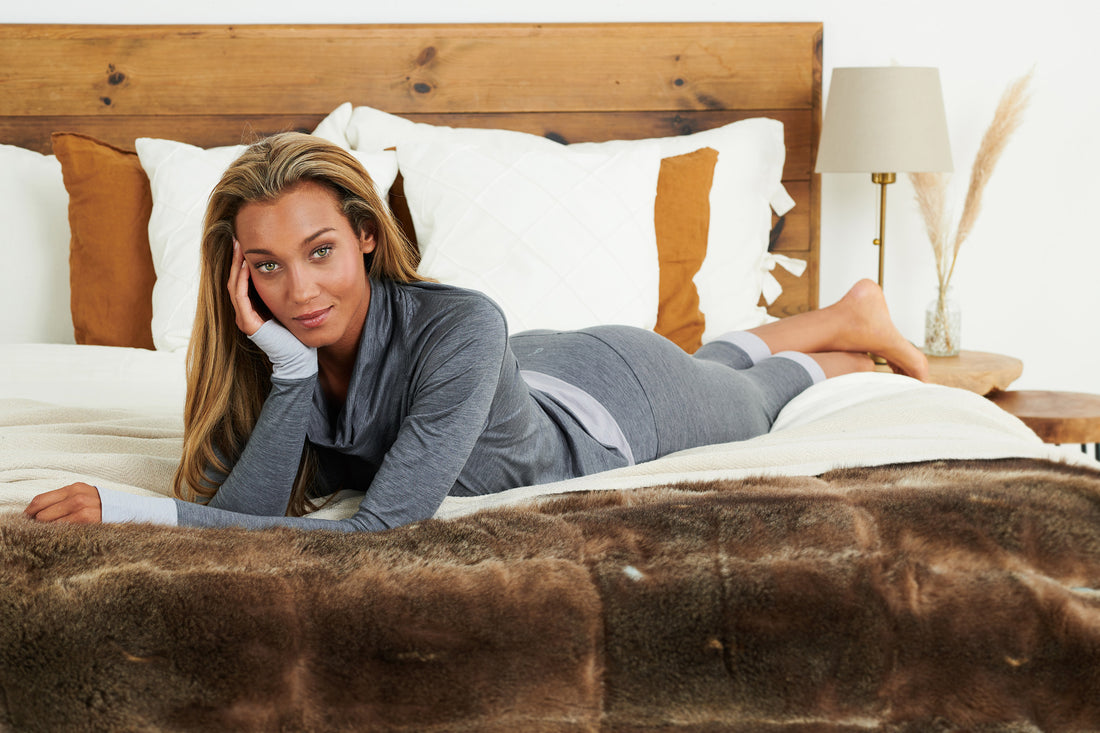
What makes merino wool pajamas the winner in bed?
— Why merino wool beats both cotton and synthetics as your best sleep companion
A study in the US 2017 showed that almost four in five consumers prefer their pajamas to made of cotton. But is this really the best fabric to sleep in? 3 factors are particularly important when evaluating a fabric’s suitability for sleep:
1. Keeping the ideal sleeping temperature
To support our sleep comfort and sleep quality in the best possible way our sleepwear should help to keep us in the ideal climatic comfort zone. By keeping the best temperature to sleep in we can avoid disruptions to our important deep sleep phases and sleep both deeper and longer.
2. Don’t let sweating at night disrupt your sleep
Sweating is a normal part of our bodies thermoregulation process but if our sleepwear gets wet we easily get cold. For the optimal night comfort we need our fabric to help cool us down through evaporative cooling but to remain dry to the touch through a combination of moisture wicking and quick drying abilities.
3. Softness without friction
During the night the blood flow to our skin increase as part of our nightly regeneration process, that’s why it’s called beauty sleep! However, this also makes us more sensitive to touch so the fabrics closest to our skin should provide a light softness without friction that can disturb.
So who is the winner then? Let’s start by looking at cotton versus merino woool
Cotton versus merino wool
Is the traditional cotton better than a merino wool pajamas? Many might not think about it but the same benefits that makes merino wool beloved as a base layer, makes it a superior bed companion compared to cotton.
1. Merino pajamas regulates your temperature naturally
Both cotton and merino wool are breathable fabrics but the merino wool is superior in terms of its ability to keep you warm when cold and cooling you down when hot. The natural crimp of the merino wool means that air pockets are trapped in the fiber, working as an insulator when it’s cold. If you do get warm and start to sweat the moisture evaporates through the merino fiber in a way that helps to cool you down. With merino wool you don’t only have the best winter pajamas, it also works wonders during the warmer months.
2. Beat the night sweats with merino pjs
Cotton is a super absorbent fibre, it can actually absorb up to 20 times it’s own weight in water. This however means that once it’s wet is heavy and very slow drying, so you will have a wet and clingy fabric on your skin creating discomfort and disturbing your sleep. Merino wool however combines moisture evaporation with moisture wicking properties meaning that you cool down whilst keeping dry. That makes them the best pajamas for night sweats!
3. Who is the softest of them all?
Wool has a reputation for being a bit itchy but with merino wool that is no longer an issue! Merino wool is naturally long and and super-fine which gives is a smooth and soft surface. It’s also crease resistant as it springs back into shape if you bend the fibres. Cotton fibres on the other hand easily bend out of shape which leads to creases. This can create discomfort and friction as you sleep.
So basically merino wool gives you the benefits of a natural fibre like cotton but with moisture and temperature regulating powers of high performance fibres. So how does it fare against synthetics?

Merino wool versus synthetics
Many sports garments today are made out of synthetic materials but merino wool is used more and more. If you compare the sleep comfort of merino wool versus synthetic material there is only one clear winner.
1. The best temperature for sleep
Merino wool regulate body heat much better than any synthetic material. The merino sheep live in environments where the temperature fluctuate from freezing cold to blazing heat and the merino wool is designed to regulate the temperature regardless of the circumstances. If you are warm the wool will transport moisture and warm air away from the skin, if you are cold it will insulate to help heat you up making it ideal for winter pajamas. Synthetic materials don’t benefit from the extraordinary breathability of merino wool so will be much less effective in adapting to your temperature needs.
2. Benefit from dual moisture management with merino pajamas – smell free!
Merino wool pajamas offers extra-ordinary moisture management by combining moisture evaporation to cool you down with moisture wicking to help keep you dry. Merino wool can absorb up to 35% of its weight in moisture without feeling wet compared to only 7% for synthetics. Merino wool sleepwear is also naturally anti-bacterial and will not start to stink like many synthetic materials.
3. The softest, most natural sleep comfort comes in the shape of merino wool sleepwear.
The ultra-fine wool from merino sheep is both naturally super soft as well as non-itchy. It’s much softer than most synthetic materials
And the added benefit? You can sleep easy knowing that there is no adverse impact on the environment as wool is biodegrabable. That means that unlike synthetics, wool will decompose and become part of the natural cycle of life again.
Find your favorite merino wool pajamas
The Dagsmejan Stay warm collection pair super-fine merino wool with high-tech Tencel from Eucalyptus to give you ultra-light, breathable warmth. It’s 4x more breathable than cotton and twice as soft.







